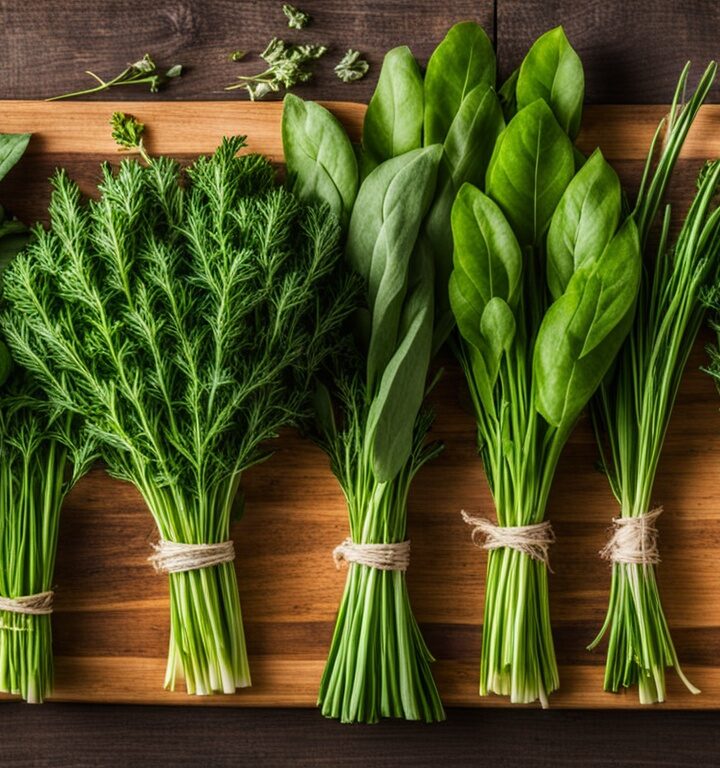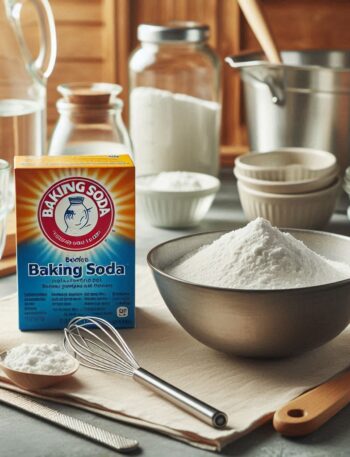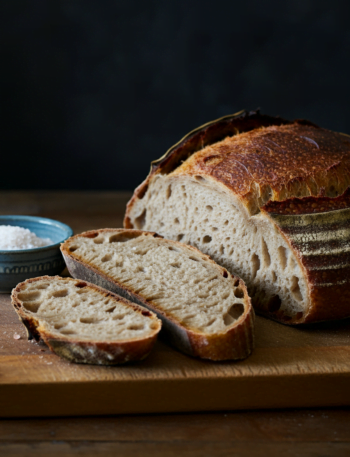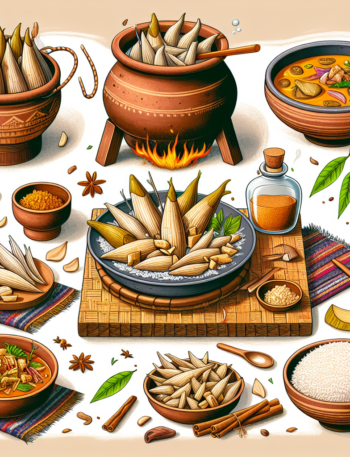Keeping your fresh herbs fresh and flavorful is key for any cook. This guide will show you the best ways to store herbs. We’ll talk about storing them in the fridge, at room temperature, freezing, and drying. You’ll learn how to keep herbs like basil, cilantro, and parsley fresh for a long time.
Key Takeaways
- Proper herb storage is essential for maintaining their flavor, aroma, and nutritional value.
- Refrigeration, room temperature storage, freezing, and drying are the primary methods for preserving fresh herbs.
- Different herb varieties have unique storage requirements, so understanding their specific needs is crucial.
- Harvesting and handling techniques, as well as moisture management, are important factors in maximizing herb freshness.
- Storing fresh herbs correctly can significantly extend their shelf life, allowing you to enjoy their vibrant flavors for longer.
Introduction to Fresh Herb Storage
Storing fresh herbs right is key to keeping their flavor, aroma, and longevity. If you don’t store them well, they can wilt, lose color, and lose their strength. But, using fresh herbs brings big benefits. They make dishes taste better, add more nutrition, and make cooking more exciting.
Why Proper Storage Matters
Keeping herbs fresh is vital for their quality and taste. Herbs are very delicate. If not stored right, they lose their color, taste, and smell fast. Storing them correctly lets you use their best qualities in your cooking.
The Benefits of Fresh Herbs
Fresh herbs can take your dishes to a new level. They bring a unique flavor that dried herbs can’t match. Plus, they’re full of nutrients like vitamins, minerals, and antioxidants. Adding fresh herbs to your food makes your meals brighter and more vibrant.
“The difference between a good dish and a great dish often comes down to the use of fresh, high-quality herbs.”
Knowing how to store herbs right and the benefits of using fresh herbs can improve your cooking. It opens up a world of flavors and health benefits.
Refrigerator Storage Methods
Storing fresh herbs in the fridge is a great way to keep them tasty and fragrant. To keep your herbs fresh, it’s important to know the best temperature and humidity levels. Also, choosing the right containers is key.
The Ideal Refrigerator Environment
To keep fresh herbs in top shape, you need the right fridge conditions. Aim for a temperature of 35°F to 40°F (2°C to 4°C) and a humidity of 90-95%. This cool, moist setting stops herbs from drying out and keeps their flavors bright.
Choosing the Right Containers
The container you pick can greatly affect how well fresh herbs stay fresh in the fridge. Here are some top picks:
- Plastic bags or containers with small holes or perforations to allow for air circulation.
- Glass jars or Mason jars with a bit of water in the bottom to keep moisture in.
- Herb keepers or special containers made for storing herbs.
Stay away from airtight containers. They can trap moisture and make herbs wilt and spoil faster.
| Herb | Ideal Refrigerator Storage Conditions |
|---|---|
| Basil | 35-40°F (2-4°C), 90-95% humidity, in a plastic bag or container |
| Cilantro | 35-40°F (2-4°C), 90-95% humidity, in a plastic bag or container |
| Parsley | 35-40°F (2-4°C), 90-95% humidity, in a plastic bag or container |
By using these fridge storage tips, you can keep your herbs fresh and flavorful for a longer time.
What Is the Best Way to Store Fresh Herbs?
Keeping your fresh herbs fresh and flavorful is key for tasty meals. Knowing the best temperature, humidity levels, and containers is essential. Let’s explore the best ways to keep your fresh herbs fresh.
Optimal Temperature and Humidity
The perfect temperature for storing fresh herbs is between 35°F and 40°F. This cool, damp environment helps prevent wilting. It also keeps the herbs’ essential oils, ensuring they stay aromatic and tasty. Plus, the humidity should be between 90% and 95%. This keeps your herbs crisp and flavorful.
Containers for Fresh Herb Storage
Choosing the right container is crucial for storing fresh herbs. The best way to store fresh herbs is in a glass or plastic container with a damp paper towel or cloth. This setup maintains a humid environment, keeping herbs fresh. Or, you can store them in a vase or jar with water, just like flowers. This method keeps stems hydrated and leaves vibrant.
“The key to preserving the flavor and aroma of fresh herbs is to provide them with the right conditions for storage.”
By following these guidelines for ideal temperature and humidity and using the right herb storage containers, your fresh herbs will stay fresh longer. This lets you enjoy their delicious flavor in your cooking.
Room Temperature Herb Storage
Some herbs do better at room temperature than in the fridge. Finding the best way to store them at room temperature keeps them fresh and tasty.
Ideal Conditions
For room temperature herb storage, it’s all about the right temperature and humidity. Most herbs like a warm spot, between 60-70°F (15-21°C). If it’s too hot or cold, they’ll quickly lose their flavor.
Humidity matters too. Herbs need a bit of moisture, with a humidity level of 50-70%. Too dry makes leaves brittle and loses oils. Too wet can cause mold.
| Ideal Room Temperature | Ideal Relative Humidity |
|---|---|
| 60-70°F (15-21°C) | 50-70% |
To keep herbs fresh, use a herb crisper or a container with a loose lid. Don’t put them in direct sunlight or near heat. With the right storage, your herbs will stay fresh and flavorful longer.

Freezing Fresh Herbs
Freezing is a great way to keep fresh herbs and enjoy their flavors all year. Before you freeze them, make sure to prepare them right. This ensures they stay fresh and smell great.
Preparation for Freezing
Start by washing and drying your herbs well. Remove any leaves or stems that are damaged or not looking good. Some herbs, like basil, might need a quick blanch in boiling water to keep their color and taste.
Freezing Methods
- Ice Cube Tray Freezing: Fill an ice cube tray with chopped herbs and cover with water or broth. Once frozen, pop the herb cubes out and store them in an airtight container or freezer bag.
- Flat Freezing: Spread the prepared herbs in a single layer on a baking sheet and place in the freezer. Once frozen, transfer the herbs to an airtight container or freezer bag.
- Bundling: For whole herb leaves, gather them into small bundles and wrap in plastic or foil before freezing.
It doesn’t matter which method you choose, always label your frozen herbs with their type and date. This way, you can easily keep track of how fresh they are. Using the right freezing methods for herbs lets you enjoy freezing fresh herbs throughout the year.
Drying Fresh Herbs
Drying is a great way to keep the flavors and smells of fresh herbs. By drying them carefully, you can enjoy their taste and smell for months. Let’s learn about drying fresh herbs and the best ways to keep them potent.
Preparing Herbs for Drying
First, wash the herbs under cool water and pat them dry with a clean towel. Remove any leaves that are damaged or not healthy. This makes sure you’re drying only the best parts.
Drying Methods
There are several good ways to dry fresh herbs. Here are the main methods:
- Air Drying: Tie the herbs in small bundles and hang them in a place with good air flow, but not in direct sunlight.
- Oven Drying: Spread the herbs on a baking sheet and bake in a low oven (about 100°F) for 2-4 hours, checking often.
- Dehydrator: Use a dehydrator set at 95-115°F, following the instructions for the best results.
Watch the herbs closely while they dry to avoid drying them too much or making them change color.
Storing Dried Herbs
After drying, put the herbs in airtight containers like glass jars or bags. Store them in a cool, dark place to keep their flavor and smell. If stored right, dried fresh herbs can last up to a year.
Drying herbs is a simple way to keep their essence. By following these tips, you can learn how to dry fresh herbs and improve your cooking for months.
Storing Different Herb Varieties
Preserving the freshness and flavor of your herbs is crucial. Each herb, from basil to cilantro and parsley, has its own best storage conditions. Knowing these can help keep your herbs fresh for longer.
Basil
Basil loves warm places but is delicate. To keep it fresh, treat it like a bouquet of flowers. Cut the stems, put them in water, and cover with a plastic bag. Keep it at room temperature, out of direct sunlight, and change the water often to prevent it from wilting.
Cilantro
For cilantro, the fridge is the best place. Wrap it in a damp paper towel and seal it in a plastic bag or container. This keeps it moist and fresh. Use it within a few days for the best taste.
Parsley
Parsley prefers cooler temperatures. To store it, wrap the stems in a damp paper towel and put them in a sealed plastic bag in the fridge. This way, it can stay fresh for up to a week.
Knowing how to store different herbs helps keep them flavorful and aromatic. This way, you can enjoy them in your cooking to the fullest.
Storage Life Expectancy
Knowing how long fresh herbs last is key for planning and using them well. You can store your herbs in the fridge, at room temperature, or in the freezer. Knowing their shelf life helps you use your fresh herbs better.
Here’s a quick overview of the average storage life expectancy for various herb storage methods:
| Storage Method | Average Shelf Life |
|---|---|
| Refrigerator | 5-10 days |
| Room Temperature | 2-4 days |
| Freezer | 6-12 months |
| Dried Herbs | 1-3 years |
The actual herb storage life expectancy can change based on the herb type, storage conditions, and how you handle them. Using the right storage methods, like keeping the right temperature and humidity, can make your herbs last longer.
By knowing how long fresh herbs last, you can plan better, reduce waste, and enjoy the fresh flavors and smells of your herbs for a longer time.

Tips for Maximizing Freshness
Keeping your herbs fresh and full of flavor is key for great cooking. There are many tips and best practices to help you enjoy your fresh herbs. Let’s look at how to harvest, clean, and manage moisture to keep your herbs perfect.
Harvesting and Cleaning
Harvesting your herbs right is crucial for keeping them fresh. Always snip or cut the herbs, don’t pull them out by the roots. This stops you from damaging the leaves and stems. Rinse the herbs under cool water to get rid of dirt, then dry them with a clean paper towel or cloth.
Moisture Management
Getting the moisture right is key for keeping herbs fresh. Avoid letting the herbs sit in water, as this can lead to premature spoilage. Store them in a way that lets air get in, like in a loosely closed container or wrapped in a damp paper towel. Check the moisture often and adjust it to keep the herbs from drying out or getting too wet.
By following these simple tips for proper herb harvesting and cleaning, and managing moisture levels, you can keep your herbs fresh and flavorful for longer. With a bit of extra care, you’ll enjoy the fresh taste of herbs in your cooking for days.
“The secret to delicious cooking is often found in the freshness of your herbs.”
Conclusion
In this article, we’ve looked at the best ways to keep fresh herbs tasty and fragrant. You now know how to keep your herbs fresh, whether you store them in the fridge, at room temperature, or by freezing or drying. This knowledge helps you enjoy your herbs for longer.
By using the storage tips we shared, you can make your fresh herbs last longer. You’ll learn how to keep the right temperature and humidity. This way, you can enjoy the real taste of herbs like basil, cilantro, or parsley.
Proper storage is key to getting the most out of your fresh herbs. With these tips, you can improve your cooking and make your dishes more flavorful. So, get ready to enjoy fresh, vibrant herbs in your kitchen for weeks.
FAQ
What is the best way to store fresh herbs?
You can store fresh herbs in the fridge, at room temperature, by freezing, or drying. The best method depends on the herb type and what you prefer.
Why is proper storage important for fresh herbs?
Storing herbs right keeps them fresh and flavorful. If not stored well, they can wilt, lose color, and lose their strength. Using fresh herbs adds flavor, nutrition, and makes cooking more exciting.
What are the optimal temperature and humidity levels for refrigerator storage of fresh herbs?
Keep fresh herbs in the fridge at 35°F to 40°F with 90-95% humidity. This keeps them from wilting and keeps their taste and freshness.
What are the best containers for storing fresh herbs in the refrigerator?
Use glass jars, plastic bags with holes, or containers with damp paper towels or cotton cloths. These keep moisture levels right.
What are the ideal conditions for room temperature storage of fresh herbs?
Store herbs at room temperature, 60°F to 70°F, with 50-60% humidity. Basil and oregano do well here, not in the fridge.
How can I prepare fresh herbs for freezing?
Wash and dry the herbs first. You can chop or keep them whole. Then, freeze them in airtight containers or on a baking sheet before moving to a freezer bag or container.
What is the best way to dry fresh herbs?
Dry herbs by hanging them upside down in a dry place or using a food dehydrator. This method keeps their flavor and aroma while drying them out.
How can I best store different herb varieties?
Each herb type has its own storage needs. Basil likes room temperature, cilantro and parsley do well in the fridge, and rosemary and thyme can be dried or frozen.
How long can I expect fresh herbs to last in different storage methods?
Fresh herbs can last 3-7 days in the fridge, 1-2 weeks at room temperature, 6-12 months frozen, and 1-2 years dried.
What tips can I use to maximize the freshness of my fresh herbs?
To keep herbs fresh, harvest and clean them well, manage moisture, and use the right storage for each type of herb.






